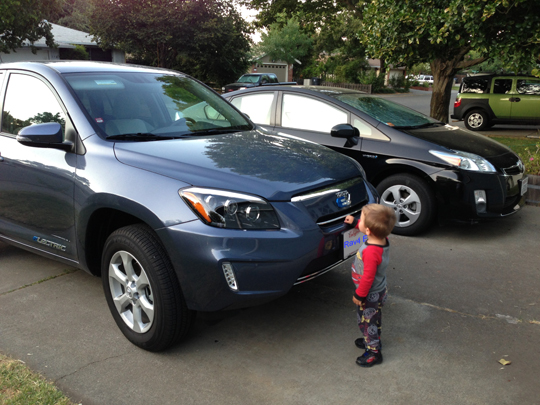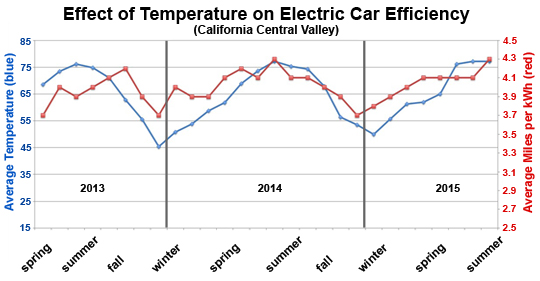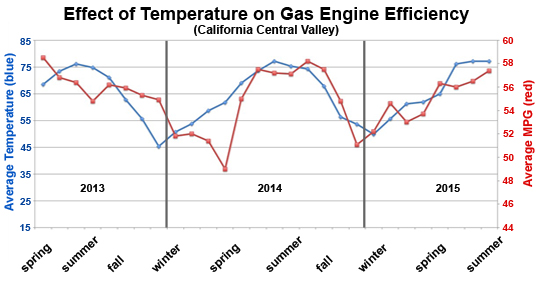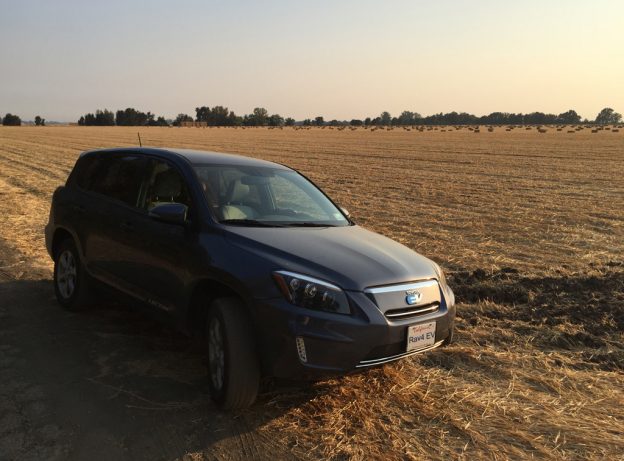October 2015. California's Central Valley
This article was originally posted on Transport Evolved in October 2015.
How does temperature effect the range of your EV in cold weather? How about your gas-powered car? Interested? Read on….
For those driving their car with an eye on energy efficiency summertime makes it easier to drive further on less energy. Case in point? Here in the Sacramento region of California, it was 100°F on Saturday, 103°F Sunday and 104°F on Monday. But my electric car efficiency was better than ever. With temps over 100, you might be looking ahead to cold weather. But those who drive electric cars know that cold weather impacts the driving range of an electric car.
That’s because modern lithium-ion batteries like to be kept warm, or at least at a temp comparable to a warm day. Just like us the batteries are best when not too hot and not too cold.
But what you may not realize is that electric cars aren’t alone: internal combustion engine vehicles prefer warmer weather, too.
Warmer temperatures can increase range and improve efficiency of an electric car, in part by lowering the internal resistance of the cells within the battery pack. My 2012 Toyota Rav4 EV is most efficient when it’s nice and warm. But like I’ve already said, you don’t want your battery pack to get too warm.

To keep the battery pack in the ‘goldilocks zone’ of optimum temperature, the battery pack in my car is liquid cooled and temperature controlled so that it doesn’t get too warm in the summer, or too cold in the winter. Keeping the battery pack operating in this optimum temperature zone balances the best possible energy efficiency with battery longevity.
But the same thing is true of engines in gasoline and diesel powered cars.
The temperature in most internal combustion engines is controlled by liquid coolant that circulates through the engine block when the temperature gets too high. That coolant is the life blood of the engine, and without it things get pretty bad.
Just as colder temperatures cause an electric car’s battery pack to perform sub-optimally, Cold temperatures decrease the range of gas powered cars too, even though this is not as well publicized.
I have proof.
I’ve recorded the MPG fuel economy for my 2010 Toyota Prius, and the MPK (miles per kilowatt hour) for my electric Toyota Rav4 EV over two plus years. It turns out that lower temperature in the winter decreases efficiency for both cars to the same degree. In the graphs below you can see how the MPK of my Rav4 EV, and the MPG of my Toyota Prius vary with seasonal changes in temperature.

The average monthly temperature for my town is plotted in blue. The mileage efficiency of my cars is shown in red.
When looking at the data for my Rav4 EV, I found that my mileage in December was decreased by 8% from average MPK efficiency, and was 14% lower than the best mileage I got during summer months.

But in looking over the data from my gas powered car, I saw that the effect was pretty much the same. My average MPG in cold weather decreased by 11% from average, and was 16% lower than the best MPG I got in warmer months. What this data shows is that cold weather decreases efficiency and range of gasoline powered engines too.

I should point out that I live in California’s Central Valley where it doesn’t get nearly as cold as it does on the east coast of the US, where I grew up. YMMV. However, the two cars were driven on the same routes and by the same people. So this is a good comparison of EV versus gas powered efficiency in California.
The impact of cold weather on driving range has not been a topic of conversation about gasoline powered cars. That’s because most gas tanks have enough in reserve so that the drop in range and efficiency isn’t very noticeable — and when you’re not filling up every day, you don’t notice the extra fuel you’re pumping in during cold spells.
In contrast, losing a similar percentage in EVs with 80 miles of range is noticeable. My first EV was a 2012 Toyota Rav4 EV was on the market in California that had a slightly larger (for it’s time) 41.8 kWh battery pack with 113 EPA rated miles and a bit more buffer against cold weather. Larger batteries help, and folks driving EVs through very cold winters can take advantage of features available on EVs, like pre-conditioning. But, cold weather will continue to be a topic until manufacturers begin selling affordable electric cars with longer range.
Hopefully that day isn’t too far off with the 200 mile Chevy Bolt, Tesla Model 3, and a longer range Nissan Leaf on the horizon. (ed: remember this was written in 2015)

